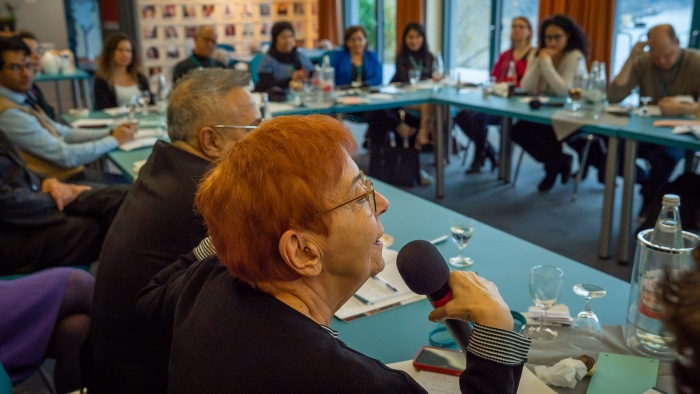»The German Islam Conference Should be Dissolved!«
High-Profile Working Group Calls for New Islam, Integration, and Migration Policy

polis-treffen_169.jpg
Photo from the founding meeting of the AK Polis at the Giordano Bruno Foundation headquarters, with Lale Akgün and Ali Ertan Toprak in the foreground.
"German Islam policy has largely failed, as it has hindered integration and strengthened extremists," say Lale Akgün (SPD) and Ali Ertan Toprak (CDU). With the high-profile "Working Group Political Islam" (AK Polis), which went public today for the first time, they are calling, among other things, for the dissolution of the "German Islam Conference."
The "German Islam Conference" (Deutsche Islamkonferenz, DIK) was established in 2006 by then German Interior Minister Wolfgang Schäuble to enable a sustainable dialogue between the state and Muslims living in Germany. Schäuble's successors Thomas de Maizière (CDU), Hans-Peter Friedrich (CSU), Horst Seehofer (CSU), and Nancy Faeser (SPD) continued the DIK, which is currently in its fifth phase.
According to AK Polis, there should not be a sixth phase of the DIK. Some members of the working group, such as Hamed Abdel-Samad, Seyran Ateş, Ralph Ghadban, Necla Kelek, Ahmad Mansour, Sineb El Masrar, and Ali Ertan Toprak, speak from personal experience, as they themselves were involved in the German Islam Conference. "After almost 20 years, those politically responsible should admit that the experiment of the German Islam Conference has failed!" states the "Working Group Political Islam," which went online today with its website ak-polis.de. "By focusing on conservative to reactionary Islamic associations, the DIK has even sabotaged integration policy, as it gave foreign governments and movements like the Muslim Brotherhood even greater influence. Therefore, the German Islam Conference should be dissolved after the upcoming federal election, and the freed budget funds should be redirected into regular integration policies! Because integration is not achieved through state promotion of Islam, but through effective teaching of language, education, and work."
Islamism and right-wing extremism reinforce each other
In addition to dissolving the DIK, AK Polis calls for the establishment of an "Expert Group on Political Islam" within the federal government. A similar body was dissolved in 2022 by Federal Interior Minister Nancy Faeser, arguing that there was no need for it. In contrast, AK Polis states: "Political Islam has become a threat to freedom and security in Germany. The problem permeates large parts of social life and is evident in Islamist bullying in schools, violence against women and homosexuals, intimidation of critics of Islamism and ex-Muslims, the spread of Islamist propaganda in digital spaces, political influence by Islamists through parties, associations, and mosques, in caliphate demonstrations, anti-Semitism, and terrorist attacks. The trivialization of this threat by political leaders must end, as it has not only strengthened Islamism but also right-wing extremism in Germany."
The working group's decision to go public now is also related to "the fact that right-wing populist to right-wing extremist forces are increasingly exploiting the problem of Political Islam to make anti-Muslim and xenophobic positions socially acceptable," says Michael Schmidt-Salomon, chairman of the Giordano Bruno Foundation and also a member of AK Polis. "Islamism and right-wing extremism fuel each other. Every Islamist attack boosts support for the AfD, and every increase in AfD support gains new backers for the Islamists. It is high time to break out of this escalation spiral. However, this will only succeed if the established democratic parties take the necessary political measures to protect this country from both religious and nationalist extremists."
The policy resolution developed by AK Polis at its founding meeting last November contains many concrete proposals that could curb the dangers of Political Islam and to strengthen the liberal-democratic basic order as well as freedom of belief. The necessary expertise of AK Polis can hardly be disputed, as it involves experts who have significantly shaped the critical debate on German Islam, integration, and migration policy in recent years. Among the members of the working group are both practicing Muslims like Seyran Ateş (Imam of the liberal Ibn Rushd Goethe Mosque in Berlin) and staunch non-Muslims like Mina Ahadi (Chairwoman of the Central Council of Ex-Muslims).
"We are a cross-party and ideologically pluralistic network," explain Lale Akgün and Ali Ertan Toprak. "Of course, we do not agree on every point, but we have all realized that we can only establish a sustainable Islam, integration, and migration policy together. With the founding of AK Polis, we have reached a first milestone. We would be happy to advise the future federal government in developing the overdue reforms."
Links to this news article:
- »Deutsche Islampolitik ist weitgehend gescheitert!«: Assessment by muslims and migration experts (Bild.de, 31.1.2025)
- »Sie wissen alles – und tun trotzdem nichts dagegen«: Interview with Lale Akgün zu den Zielen des AK Polis (Welt, 7.2.2025)
